Have you ever been stuck on a boat, and you’ve had to ask the captain where your title is? Many people think that there is a title for every boat. And if you’re not sure what the title is, you may think it doesn’t matter.
If you love boating, you’ve probably wondered how to get a title for a boat that doesn’t have one. This is a common question we get asked by people who often don’t know how to buy a boat.
In this blog post, we’ll take a look at some of the different things that come into play when choosing the title of your boat. You’ll also get the answers to your questions, and make sure to learn how to get a title for a boat that doesn’t have one.
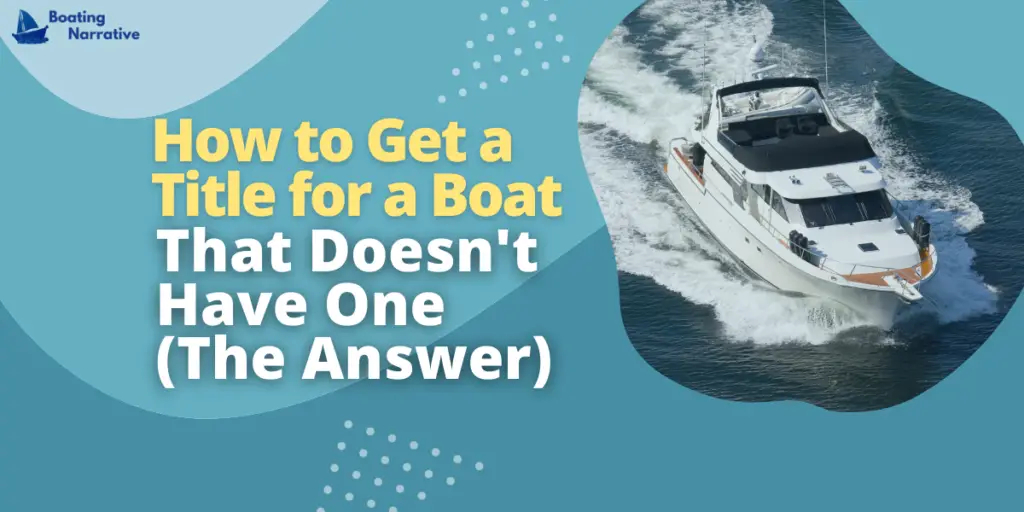
Here’s How to Get a Title for a Boat that Doesn’t Have One:
Obtaining a Certificate of Title is a requirement. You can get this certificate by completing an application and submitting it with proper identification and payment to the appropriate state department. Certificate of Title will be issued by a state’s Department of Motor Vehicles (DMV) that proves a boat’s legal owner.
Without a title, boats are essentially vessels with no owner. Having no title presents a myriad of issues, including the fact that boats cannot legally be operated on the public waterway.
Getting A Title, Step by Step
Luckily, the process is relatively simple and only requires a few steps.
- The first step is to get a bill of sale from the previous owner or the selling company. This will serve as proof of ownership.
- Next, you’ll need to locate the hull identification number (HIN). This is usually located on the stern of the boat.
- Once you have the HIN, you can fill out a form at your local Department of Motor Vehicles (DMV) office.
- After the form is completed, you will need to pay a fee. After that, you will be issued a registration number for your boat.
- With the registration number, you can then get a title for your boat.
What Makes a Title Needed?
A boat title is needed in order to register the boat with the coast guard. The title is also needed to establish clear ownership of the boat. And it helps to ensure that the boat meets safety standards.
In some states, boats must be titled if they are used for certain purposes, such as commercial fishing or carrying passengers for hire. Other states require boats to be titled only if they are motorized. In still other states, there is no requirement to a title or register boats at all.
There are different requirements for titling a boat, depending on the type of boat. For example, a personal watercraft needs different titling than chartered boats.
Can You Buy a Boat Without a Title?
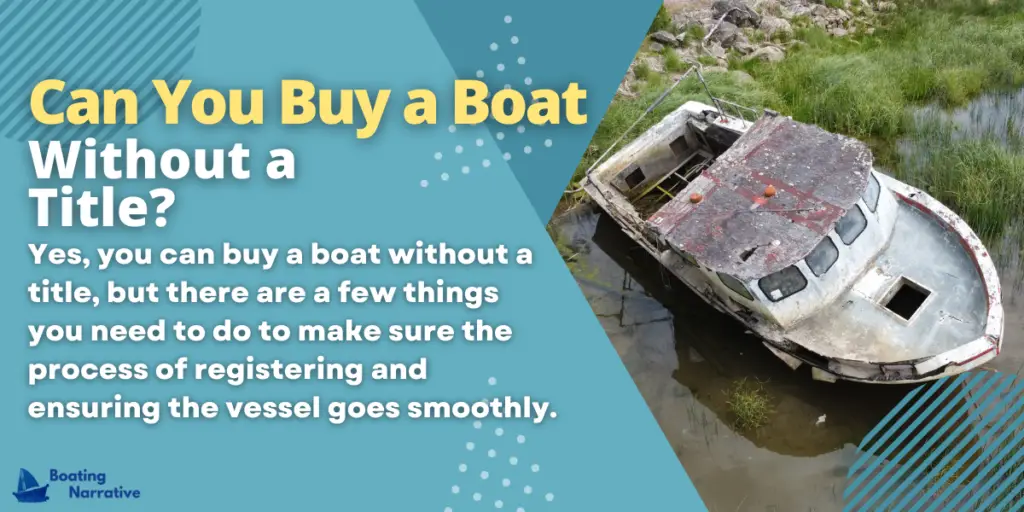
Yes, you can buy a boat without a title, but there are a few things you need to do to make sure the process of registering and ensuring the vessel goes smoothly. In a few states, a bill of sale is adequate proof of purchase to register a boat. Other states may require additional documentation, such as a notarized statement from the seller confirming ownership of the boat.
First, you’ll need to get a registration certificate and a manufacturer’s certificate from the manufacturer. Next, you’ll need to get a notary to witness the paperwork. Finally, you’ll need to submit the paperwork to the DMV in the state of Florida or Ohio, depending on where you live.
Finding Who Owns the Boat
You can usually find this information (although limited) on the back of the title or on the registration documents. Once you have this information, you’ll need to fill out a specific template and submit it to the local DMV.
The DMV will then issue a legal document that provides further information about the current owner of the boat. There are a couple of alternative options available to you.
- Check with your local marina or boating association. They may have records of who owns the boat.
- Check with the Coast Guard. They may have records of who owns the boat.
- Check with the Department of Motor Vehicles. They may have records of who owns the boat.
Requirements to Get a Title
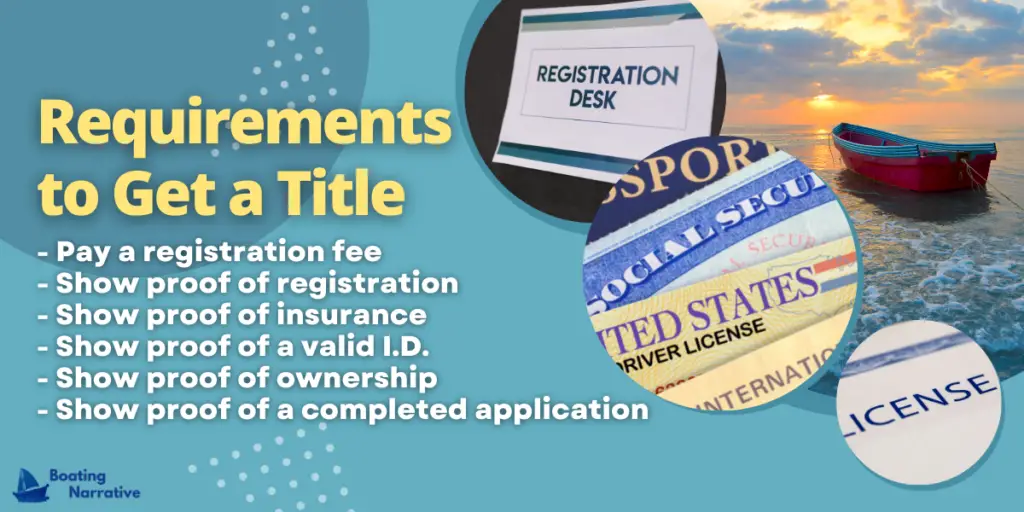
There are a few requirements that must be met in order to get a title for your boat. The first is that you must be the current owner of the boat. This means that you must have acquired the boat from the previous owner and be in possession of a bill of sale or receipt stating the date of the transaction and the amount of the purchase.
The second requirement is that you must have the boat’s initial registration. This can be obtained from the state where the boat was originally registered. Finally, you must show proof of sales tax paid on the purchase price of the boat.
So, all in all, the boat owner will need the date of sale, initial registration, propulsion, inboard motor, horsepower, purchase price, sales tax, invoice, and receipt. The boat owner will also need to provide the bill of sale to the DMV.
Bonded Title
This simply means that you’ll need to put up a bond for the value of the boat. Once you’ve done this, you’ll be able to get a title from the state in which the boat is registered.
A bonded title is a sort of title that is backed by a surety bond to protect the owner’s interests. The surety bond is in place in case there are any claims made against the boat.
To get a bonded title for a boat, you will need to:
- Pay a registration fee
- Show proof of registration
- Show proof of insurance
- Show proof of a valid I.D.
- Show proof of ownership
- Show proof of a completed application
Once you have obtained all of the necessary papers, you will require to take them to a lender who specializes in bonded titles. The lender will then review your documentation and decide if they will issue you a loan for the boat.
Boat Liens
A boat lien is a legal claim against a vessel for the unpaid debt of the owner. A boat lien can be placed by anyone who has provided services, supplies, or repairs to the vessel, and the owner has failed to pay for them.
- The lienholder has the right to take possession of the vessel and sell it to pay off the debt.
- To get a boat lien, the creditor must file a notice of lien with the state where the vessel is registered.
- The notice must include the name and address of the owner, the amount of the debt, and a description of the boat.
- If the debt is not paid, the lienholder can sell the boat at a public auction.
- The proceeds from the sale will be used to pay off the debt, and any leftover money will be returned to the owner.
Bill of Sale
This document proves that you own the vessel and can be used to register the boat in your name.
To get a bill of sale, you’ll need to:
- Find the previous owner and ask them to sign the bill of sale.
- Include the following information in the bill of sale: the boat’s Hull Identification Number (HIN), make, model, and year; the selling price; and the date of sale.
- Have the bill of sale notarized.
Keep in mind that a bill of sale is different from a certificate of origin, which is required to register a new boat.
What Does the Boat Need to be Registered?
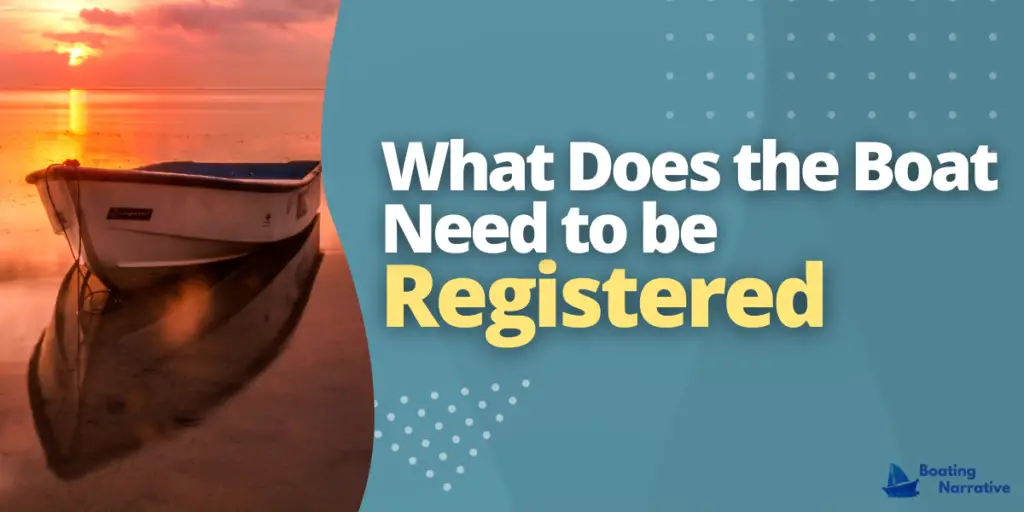
The boat will need to have a hull identification number (HIN), and you’ll need to fill out a boat title application. You may also need to provide proof of ownership, such as a bill of sale.
In some cases, the boat may be exempt from registration, but this is typically only the case if the boat is used for non-commercial purposes. In Broward County, Florida, for example, all boats must be registered with the U.S. Coast Guard.
Outboard motors must also be registered, but the registration can be transferred to the new owner if the motor is less than ten years old. You may also need to provide a fitness certificate, which proves that the boat is in good condition and safe to use.
Can Non-resident Get A Title
In these cases, the purchaser is exempt from having to get a new title. The boat commission in your state can provide you with more information on how to get a title for your boat.
But in other cases, you’ll need to fill out a Boat Bill of Sale (Form 14-317). This form is available from the Florida Fish and Wildlife Conservation Commission.
Once you have all the required paperwork, you can take it to your local county tax collector’s office or a licensed boat dealer to get your boat titled. You’ll need to pay a fee to get the title, which can typically vary a lot.
Transfer Title
These are the step to transfer the title.
- All these documents include the date of sale, the names and addresses of the buyer and seller, and a description of the vessel, including the Hull Identification Number (HIN).
- If the boat is more than 16 feet long, you may also need to include the engine serial number.
- The bill of sale should be signed by both the buyer and the seller.
- Next, you’ll need to get a completed application for title and registration from your state’s Department of Motor Vehicles (DMV) or equivalent agency.
You’ll need to provide the following information on the application:
- The date of sale
- The names and addresses of the buyer and seller
- A description of the vessel, including the Hull Identification Number (HIN)
- The engine serial number (if the boat is less than 16 feet long)
- The sales price of the boat
- The date of the bill of sale
- The signature of the seller
You may also need to provide additional documentation, such as a certificate of origin or a builder’s certificate, depending on your state’s requirements.
What Happens If the Boat Was Never Registered?
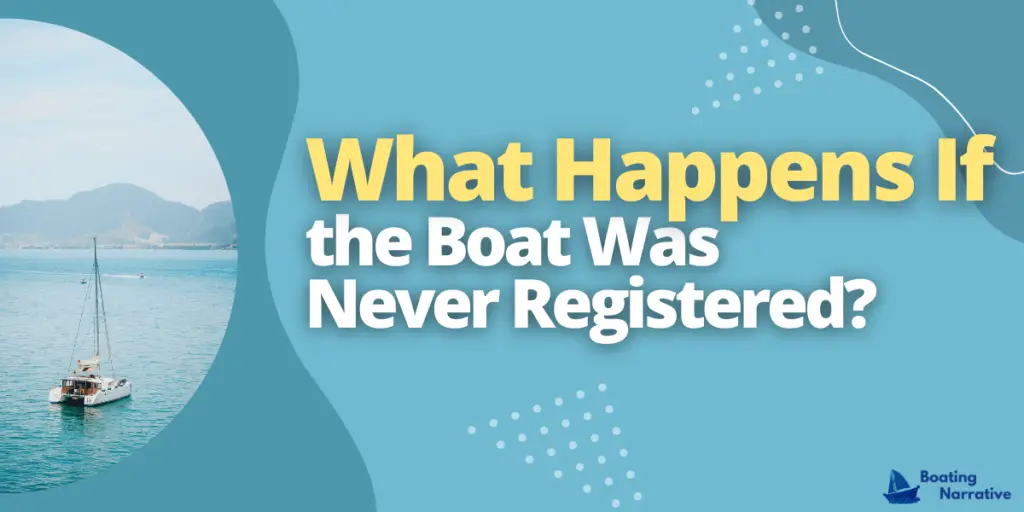
If the boat was never registered, the owner might have to go through a few extra steps to get a title for the boat. The first step is to get a letter from the Department of Motor Vehicles (DMV) stating that the boat has never been registered in the state.
The owner will then need to fill out a Boat Bill of Sale (BBOS) and have it notarized. The BBOS must include the make, model, and hull identification number of the boat.
The owner will then take the letter from the DMV and the BBOS to a boat dealer to have the boat titled in the owner’s name.
Boat Dealers Charge to Give You A Title
Boat dealers usually charge a fee to give you a title and registration card for your boat. The fee is typically based on the type of boat you have. For example, a motorboat will cost more to the title than a kayak or sailboat. The fee will also depend on the state in which the boat is being titled.
You can avoid paying the title fee by titling your boat yourself. However, this process can be time-consuming and may require some special skills or equipment.
Other Fee While Boat Titling
- If your boat’s title has been expired for more than three years, you’ll have to pay a non-refundable title transfer fee.
- If your boat is registered in another state, you’ll have to pay an out-of-state transfer fee.
- You can also pay to have your boat’s registration renewed.
How Long to Get a Title for a Boat
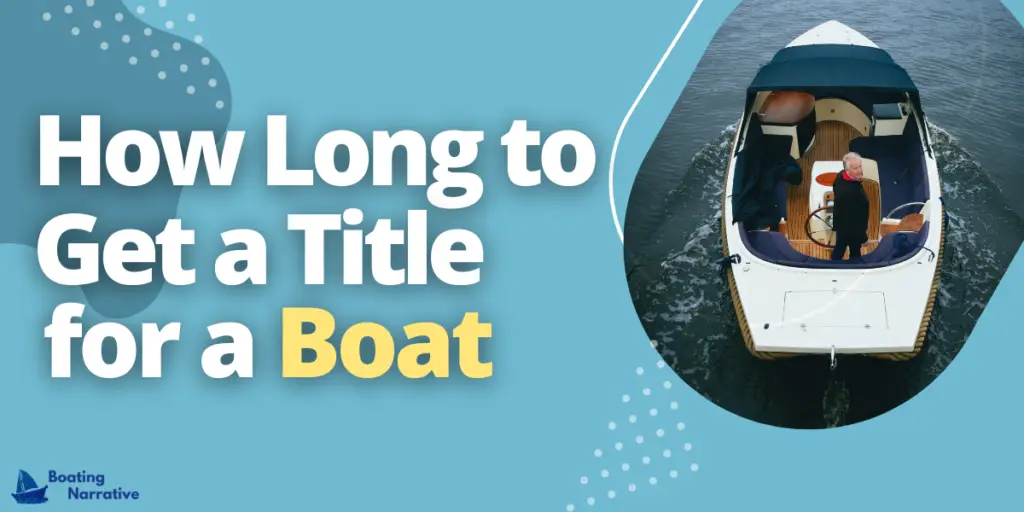
Although a boat registration can be completed quickly, there are certain procedures and regulations that must be followed. The first step is to complete a boat registration form.
This form is sent to a local county office, where it is reviewed. It is then sent to the U.S. Coast Guard for review. The Coast Guard will then approve or deny the registration.
If the registration is denied, you can appeal the denial, which can take up to six weeks. If the registration is approved, then the registration process can be completed.
What Boats Are Title Exempt
It depends on the boat type, although there are several that are excluded from having to have a title in the United States. These include lifeboats, canoes, and boats with hulls made from certain materials. Exemptions may also be granted for boats with liens.
- Lifeboats may have a legal exemption from having to have a title. However, the exemption will only be valid for life and only if it’s used to save human life.
- Canoes are exempt from having to have a title if they’re smaller than six ft.
- Boat with hulls made from certain materials.
Conclusion
If you have a boat that doesn’t have a title, you can still get one by going through the proper channels. You’ll need to submit an application to the state where the boat is registered, as well as provide proof of ownership. Once you have the title, you’ll be able to enjoy your boat without worry!

